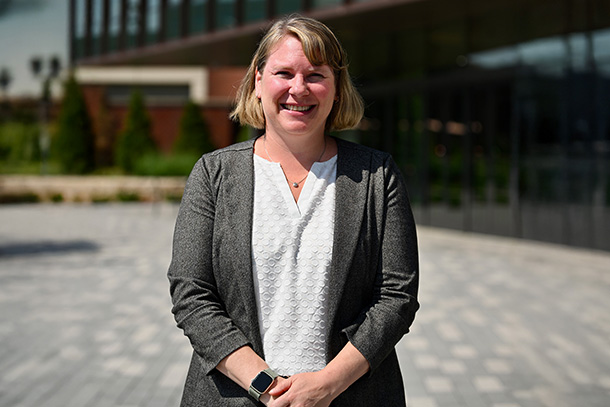
After 18 years of dedicated service to Penn State, Susan Stewart has been named assistant dean for academic support and global programs, effective July 1. Credit: Caleb Craig/Penn State.
Susan Stewart named assistant dean for academic support and global programs
June 27, 2025
By Ty Tkacik
UNIVERSITY PARK, Pa. — Susan Stewart, associate director of undergraduate studies and teaching professor of aerospace engineering at Penn State, has been named assistant dean for academic support and global programs, effective July 1. Stewart's promotion comes after 18 years of service to Penn State. She succeeds Christine Masters in the role, who recently retired after almost 30 years of service to the College of Engineering.
“It’s an honor to step into this role and have the opportunity to serve our students, faculty and staff,” Stewart said. “I know I have big shoes to fill following Christine Master’s leadership, and I’m grateful for the solid foundation she has built. I’m looking forward to working with our dedicated team and to the positive impact we can make together.”
The assistant dean for academic support and global programs oversees undergraduate student support in the College of Engineering, including academic advising, global engineering engagement and academic integrity. Stewart will ensure that students have access to various educational support systems, while collaboratively brainstorming ways to improve the undergraduate student experience at Penn State with advising faculty from across the college.
"I’m incredibly excited to welcome Professor Stewart into the role of assistant dean for academic support and global programs,” said Tonya L. Peeples, Harold and Inge Marcus Dean of Engineering. “Her time spent as the associate director of undergraduate studies for the aerospace engineering program has equipped her with extensive knowledge of the College of Engineering’s academic policies and support systems for undergraduate students. Her institutional knowledge, experience and dedication to students will allow her to excel in her new role.”
Stewart said strengthening and expanding the ways the advising team supports student success in the College of Engineering is one of her top priorities as she steps into the assistant dean role. According to her, the key to identifying new ideas and initiatives the college can implement is listening and learning from the students and staff across every department.
“I look forward to enhancing resources that help students thrive both academically and personally across the college,” Stewart said. “I want to ensure students feel connected to the resources, communities and programs that help them succeed, especially as they are making transitions across campuses or majors.”
Stewart obtained her bachelor’s degree in mechanical engineering at Penn State and her master’s degree and doctorate at Georgia Tech, where she worked as a research associate for three years before returning to Penn State in 2007. Her research focuses on renewable energy technologies and their implementation, with an emphasis on resource assessment as well as techno-economic system design optimization.
In addition to teaching, Stewart is the Accreditation Board for Engineering and Technology (ABET) coordinator for aerospace engineering, the adviser for the masters of engineering (MEng) in aerospace engineering degree program at Penn State and director of the PA REpowering Schools Program. The program exposes students to renewable energy education in elementary, middle and high schools around Pennsylvania. Working in partnership with the Center for Science and the Schools (CSATS), Stewart hosts events like the KidWind Challenge and PA Solar Energy Challenge that task young engineers with designing, constructing and testing their own wind turbines and solar powered structures. Students then present their design and design process to a panel of judges.
Stewart is also an adviser for the Penn State Wind Energy Club, which helps prepare interested engineering students for a career in wind and renewable energy. The club competes in the annual Collegiate Wind Competition, which tasks students with designing and developing their own wind turbine. The team has placed in the top three teams in nine of the 11 years they have participated.

